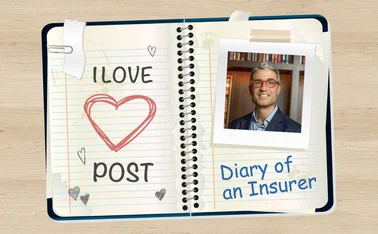
Post Claims Club Blog: So who were the Claims Heroes and Villains of 2013?

Happy new year and welcome to 2014.
I hope you all had a relaxing and refreshing Xmas break, but I am sure given the adverse weather that blighted the festive period for many, it may have been a more difficult time than usual given the spike in claims volumes.
It is somewhat timely then that at the first Claims Club meeting of 2014 we will be looking at the procurement process for suppliers, with three experts from Axa, Hiscox and Sterling; focusing on how insurers can work with their partners to provide the necessary service during both peaks and troughs.
I have no doubt many of you will have questions and observations about how the effective handling of surges begins with the choice of loss adjusters and other service providers.
For more information, and to sign up to attend this session please click here.
As is customary at this time of year, it is often good to reflect on what has gone before and look to the future. And so I would like to thank those members of the Claims Club board who did exactly that, providing a few thoughts on 2013 and also hopes for 2014. I would be interested to know what your thoughts are, too.
The Panel
Nick Gunter, head of reinsurance claims, Ageas
David Bonehill, claims director, Ecclesiastical Insurance Group
Peter Horton - GI chief operating officer, LV
Jacqui McNeilly, head of claims technical hub, Direct Line Group
Martin Ashfield, head of commercial property claims, Axa
1) Most important [positive] development in the claims space in 2013?
NG: That judges have begun to implement the Jackson reforms with a bit more bite.
DB: Introduction of MOJ reforms and EL/PL Portal. Some really positive movements that will help insurers tackle the continuous volume/fraud/inflation challenges.
PH: The findings of the Competition Commission which, if properly followed through and sensible remedies implemented, have the potential to cut claims costs and improve efficiency across the industry - meaning insurers can focus on providing excellent service for their customers at a competitive price.
JM: 2013 has had so many developments, but I'd say the progress we have made as an industry to engage the public and the government in a wide ranging dialogue around civil justice reform, as well as securing some relevant changes, has been an ongoing development of real importance.
MA: A combination of Laspo, with its great intent and potential benefits for non-claimant customers (if the industry can remove the unnecessary built-in cost from the process), and the positive and pragmatic revision of the Riot (Damages) Act in terms of bringing it up-to-date from 1886. However, the latter may end up being more an item for 2014, to ensure we are ready with clear protocols come the next time society decides to riot.
2) Most important [negative] development in the claims space in 2013?
NG: Players in the market looking to exploit loopholes or find ingenious ways around the no referral fee reforms.
DB: Insurers still failing to collaborate on surge claims. The lack of any ‘genuine' co-operation is guaranteed to bite us at some stage. This has to be a focus for 2014
PH: The development of business models which allow the maintenance of or increase in income generated for ‘referrers' of personal injury claims. This is driving [claims] frequency higher rather than lower; taking damages from claimants as success fees; and promoting the use of expensive and unnecessary medical experts and rehabilitation methods to generate a referral income.
JM: It's always difficult to see the impact storms and floods can have on our customers, especially the recent ones over the festive period, but I'd draw another positive from the way we have responded as an industry.
MA: the claims farming being done around noise-induced hearing loss and the explosion in this new cottage industry.
3) Who is your 2013 claims hero?
NG: Any robust judge who is straight down the middle and applies court rules without bias.
PH: Those insurers who still answer the phone to other insurers.... Or perhaps Lord Rupert Jackson for challenging the legal establishment and the exuberant and disproportionate legal fees generated on low value personal injury claims. Whilst more needs to be done, radical reforms such as the fixing of costs all the way to trial have broken taboos and cleared the way for further reform and efficiencies.
JM: Rather than mention an individual, I would say I've really valued the ongoing work of the ABI in representing us on key claims issues.
MA: Fraud teams and organisations throughout the business - fraud is a scourge on our industry and it is tough work outing these people.
4) Who is your 2013 claims villain?
NG: The court of appeal in the RSA case. It gives the green light to insurers to ‘play' games with each other, to the detriment of the premium-paying customer.
PH: Chris Grayling (pictured), for failing to follow through on his plans to increase the small claims track limit for RTA personal injury claims to £5000. If properly implemented, this would have achieved what the PI referral fee ban has not - a choking off of the oxygen which sustains the claims farming industry, whilst maintaining access to justice at reasonable cost for genuinely injured claimants.
MA: I Could not possibly comment for fear of litigation.......
5) If you could be granted one wish for the claims space that would come true in 2014 what would it be?
NG: That insurers stop looking at claims as a means of making money from competitors. We need a return to the days when we differentiated ourselves by our service to customers, not by how much we damage our competitors. The Court of Appeal has backed the RSA case on subrogated claims, but it is morally wrong.
DB: That we see a significant downturn in casualty claims volumes and costs. We also need to look at professionalism in both claims and in the wider insurance industry, and at how we shift from being an industry to a profession. We need to ask, ‘What is the claims sector doing to support the Aldermanbury Declaration? How are we supporting our staff's professional development? And how do we pull more talent into claims?' That is the 2014 challenge.
PH: Good and quick implementation of the recommendations for medical panels for whiplash claims - breaking any financial links between solicitors, insurers and the providers of medical reports. This should do away with ‘revolving door' consultations; improve the training and qualifications of those claiming to be delivering expert opinions; and deliver evidence which genuinely adds value to the assessment of the validity and value of a whiplash claim.
JM: Further recognition and promotion of the real value great claims skills and professionalism can deliver for our customers, with ongoing investment across the industry to continue to enhance claims capability.
MA: Please, please, please, can we try as an industry to collaborate and work smartly with scarce resources in terms of surge.
Finally, as 2014 enters its third week I have to give a great thank you to the television schedulers for blowing away the post-Xmas new year blues with some excellent television. Not least Sherlock on BBC 1, The Bridge on BBC 4 and It's Always Sunny in Philidelphia on NetFlix.
I hope to see you all on the 19th February.
Jonathan Swift
Post Claims Club Chair
Jonathan.swift@incisivemedia.com
@insuranceswifty
Only users who have a paid subscription or are part of a corporate subscription are able to print or copy content.
To access these options, along with all other subscription benefits, please contact info@postonline.co.uk or view our subscription options here: http://subscriptions.postonline.co.uk/subscribe
You are currently unable to print this content. Please contact info@postonline.co.uk to find out more.
You are currently unable to copy this content. Please contact info@postonline.co.uk to find out more.
Copyright Infopro Digital Limited. All rights reserved.
As outlined in our terms and conditions, https://www.infopro-digital.com/terms-and-conditions/subscriptions/ (point 2.4), printing is limited to a single copy.
If you would like to purchase additional rights please email info@postonline.co.uk
Copyright Infopro Digital Limited. All rights reserved.
You may share this content using our article tools. As outlined in our terms and conditions, https://www.infopro-digital.com/terms-and-conditions/subscriptions/ (clause 2.4), an Authorised User may only make one copy of the materials for their own personal use. You must also comply with the restrictions in clause 2.5.
If you would like to purchase additional rights please email info@postonline.co.uk







